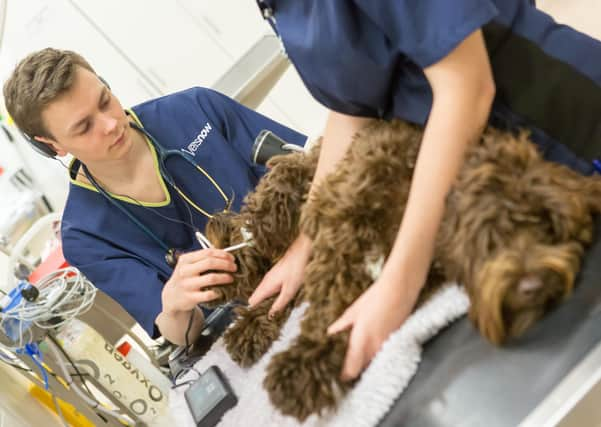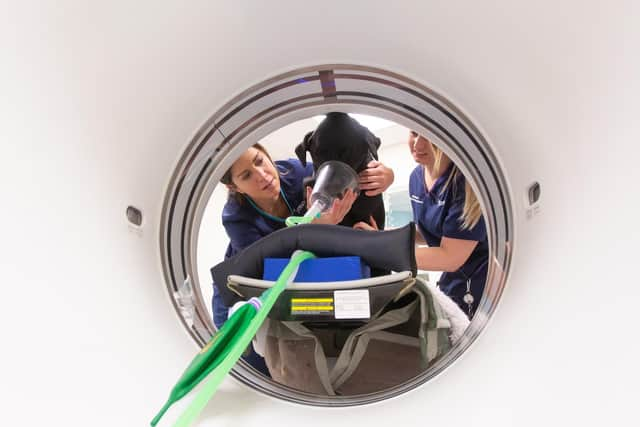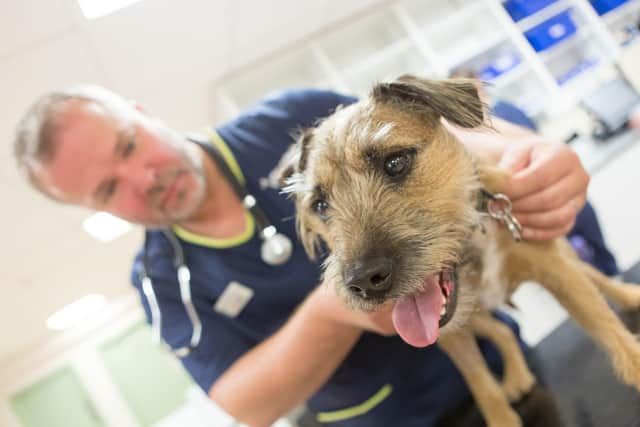Vets across Scotland remain on call for emergencies


In its recent guidance, the UK Government made it clear that all veterinary practices are permitted to remain open to provide emergency care.
My Family Pet, which has a network of daytime vet practices and referral hospitals throughout the UK and Vets Now, which has 61 pet emergency clinics and hospitals, will continue to be there for pets – day or night.
Advertisement
Hide AdAdvertisement
Hide AdThey are asking owners with a sick or injured pet to call them in an emergency.


And they are also offering a video consultation service where owners can speak to a qualified vet on their mobile, tablet or laptop – from the comfort of their own home.
If clinical teams determine a pet needs essential treatment they will be seen by an emergency vet.
Vets Now is the UK’s leading pet emergency service; its headquarters are in Fife. The business employs around 200 staff at its support office and contact centre in Dunfermline.
Advertisement
Hide AdAdvertisement
Hide AdIts emergency hospital in Glasgow is one of the most advanced facilities of its kind in Europe. Every week, vets and nurses there treat some 200 out-of-hours emergency and referral cases – dealing with everything from oncology to internal medicine and surgery.


Some of the world’s leading emergency vets are also based in Scotland, with a number of them working out of the Vets Now emergency hospital in Glasgow.
So you can rest assured your pet will be in safe hands.
Amanda Boag, who is group referral director at My Family Pet and oversees clinical leadership at Vets Now, said: “We realise this is a hugely worrying time for everyone.
“Pets should not suffer needlessly, regardless of the measures in place to tackle the spread of coronavirus.
Advertisement
Hide AdAdvertisement
Hide Ad“So if you’re worried, please do not hesitate to call us. If our staff determine that your pet needs essential treatment, we will see you.
“As a world-leading provider of veterinary care, it is our responsibility to prevent and control infections and we have thousands of vets and vet nurses who will continue to be here for pet owners at the time they need us most.
“Our practices have robust protocols in place to ensure animal welfare, alongside protection of client and staff health.”
It is estimated that 45 per cent of Scottish homes have a small animal as a pet; 14 per cent of the population owns a cat and 24 per cent a dog.
Advertisement
Hide AdAdvertisement
Hide AdKnowing care is available should their animals need help will no doubt be a huge comfort to them.
However, Vets Now is also asking owners to take necessary precautions.
Amanda added: “We want to reassure pet owners that our number one priority is the health, well-being and safety of not only their pets but our people too.
“Over the past few weeks, as the coronavirus has spread, we’ve taken a series of steps to reduce the risk of virus transmission occurring at our clinics. “In order to ensure continued care for pets across Scotland, we’re kindly urging pet owners to take a number of precautions before visiting one of our clinics or hospitals.
Advertisement
Hide AdAdvertisement
Hide Ad“In an emergency, please call us first rather than turning up at our clinics or hospitals unannounced.
“If you’re not suffering symptoms of COVID-19, and have been advised to bring your pet in, you should ideally come alone.
“This will enable us to ensure we maintain appropriate social distancing.
“If you are self-isolating but your pet needs emergency treatment, please contact us by phone and our team will make arrangements to treat your pet in the clinic or hospital.”
Advertisement
Hide AdAdvertisement
Hide AdVets Now emergency vets save thousands of pets every year at its six Scottish emergency clinics and hospitals in Aberdeen, Dundee, Kirkaldy, Edinburgh, Glasgow and Kilmarnock.
It also partners with more than 1400 veterinary practices in the UK to provide clients with an out-of-hours emergency service.
Vets Now was established in 2001 and is the leading provider of emergency veterinary care for small animals in the UK.
For more information, advice or to find an emergency vet in your area, visit the website at www.vets-now.com.
Call your vet immediately in life-threatening circumstances
Advertisement
Hide AdAdvertisement
Hide AdThe UK government’s new coronavirus measures have given millions of animal lovers more time with their pets – and more concerns than ever about what might happen if they become ill.
While veterinary practices across the country are allowed to stay open, face-to-face contact has been reduced and guidance from the veterinary surgeons’ regulatory body, the RCVS, has restricted veterinary care to emergency treatment only.
All veterinary clinics, hospitals and practices have now switched to fulfilling urgent prescriptions and providing emergency care only.
But what is an emergency? Here are some of the conditions deemed to be potentially life-threatening. In all of these cases, you should call your nearest emergency vet immediately:
Breathing difficulties
Open wound injuries
Trauma (eg car accidents)
Advertisement
Hide AdAdvertisement
Hide AdMale cats struggling in the litter tray to pass urine or faeces
Rabbits neglecting food
Swallowing hazards ie.toys/ clothes etc
Ingestion of poison/harmful substances
Eye problems
Vomiting or diarrhoea especially if it continues for more than 24 hours
Swollen abdomen or retching, especially in large dogs
Loss of thirst and appetite
Struggling to give birth
Seizures/fitting
Collapse